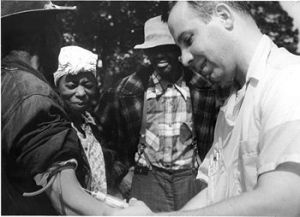
There have been so many horrors inflicted upon the least of thee at the behest of the US Government. One of the most atrocious atrocities was the infamous Tuskegee syphilis experiment, which was a clinical study conducted between 1932 and 1972 by the US Public Health Service to study the natural progression of untreated syphilis in rural African American men who thought they were receiving free health care from the U.S. government. This evil plan hatched in Tuskegee was transplanted to Guatemala after the experiment was shut down in Tuskegee.
In 2932, investigators enrolled a total of 600 impoverished sharecroppers from Macon County, Alabama from a pool of 399 of black men who had previously contracted syphilis before the study began. However, 201did not have the disease. The men were given free medical care, meals, and free burial insurance, for participating in the study. But they were never told they had syphilis, nor were they ever treated for it. According to the Centers for Disease Control, the subjects were told they were being treated for "bad blood", a local term for various illnesses that include syphilis, anemia, and fatigue.
The study was controversial for reasons related to ethical standards lasted for forty- years. The government personnel involved knowingly failed to treat patients appropriately after the 1940s validation of penicillin as an effective cure for the disease they were studying. Revelation of study failures by a whistleblower leaked led to major changes in U.S. law and regulation on the protection of participants in clinical studies.
The scientists also prevented participants from accessing syphilis treatment programs available to others in the area. The study continued, under numerous US Public Health Service supervisors, until 1972, when a leak to the press eventually resulted in the programs termination. The victims of the study included numerous men who died of syphilis, wives who contracted the disease, and children born with congenital syphilis.
Physicians in this time were fixated on African American sexuality, and the willingness of African Americans to have sexual relations with those who were infected led them to believe that the responsibility for the acquisition of the disease was solely upon the individual. This need to place blame blinded the physicians to find ways to help the innocent infants born with the disease through no fault of their own.
In 1974, Congress passed the national Research Act creating a commission to study and write regulations governing studies involving human participants. On May 16, 1997, President Bill Clinton formally apologized and held a ceremony for the Tuskegee study participants: "What was done cannot be undone. But we can end the silence. We can stop turning our heads away. We can look at you in the eye and finally say on behalf of the American people, what the United States government did was shameful, and I am sorry ... To our African American citizens, I am sorry that your federal government orchestrated a study so clearly racist."
The Tuskegee Syphilis Study significantly damaged the trust of the black community toward public health efforts in the United States. The study may also have contributed to the reluctance of many poor black people to seek routine preventive care. Distrust of the government because of the study contributed to persistent rumors in the black community that the government was responsible for the HIV/AIDS crisis by introducing the virus to the black community.
An interview in February on ABC's PrimeTime Live between ABC's Jay Schadler and Dr. Sidney Olansky, Public Health Services director of the study from 1950 to 1957, further showed why the Tuskegee study had damaged the trust between medical personnel and much of the African American community. When asked about the lies that were told to the study subjects, Olansky replied with "The fact that they were illiterate was helpful, too, because they couldn’t read the newspapers. If they were not, as things moved on they might have been reading newspapers and seen what was going on.”
John Heller, Director of the Public Health Service's Division of Venereal Diseases said, “For the most part, doctors and civil servants simply did their jobs. Some merely followed orders, others worked for the glory of science.” My question is how many of these so-called civil servants are just doing their jobs today. And that’s my thought provoking perspective…








No comments:
Post a Comment